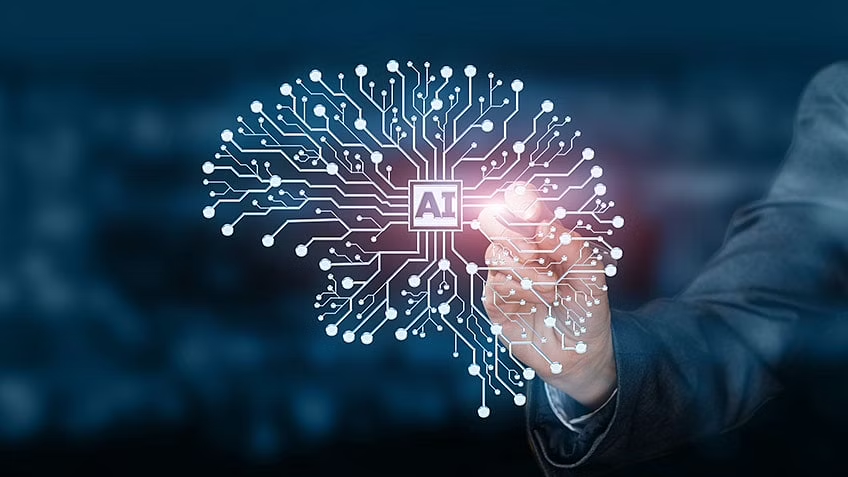Want to learn more about how Shoplazza is shaping the future of ecommerce with A.I.? Check the article we wrote for TechCrunch!
Table of contents:
1) How is A.I. used in ecommerce & related business domains?
2) What can be our expectations for the future ecommerce A.I. development?
3) Shoplazza's ecommerce A.I. solutions.
%20(3).png?width=1000&name=BLOG%20COVER%20IMAGE%20SAMPLE%20%20(1000%20%C3%97%20600%20px)%20(3).png)
We're on the brink of the ecommerce revolution, and everyone is witnessing how tech is terraforming the way we shop online, how A.I. extends its invisible presence to every corner and how A.I. also protects our shopping urges.
The growth of ecommerce is being propelled by rapid changes in consumer behavior and shopping preferences. Shopping is no longer a chore that needs to be done in person.
Instead, it has become a fun activity to be enjoyed from the comfort of one's home. In addition, shoppers now expect to be able to buy anything they want online, regardless of where they live. This has led to the rise of ecommerce giants like Amazon and Alibaba, quickly cementing their positions as the go-to destinations for online shopping.
As ecommerce grows, it's also becoming more complex. Giant retailers are starting to feel the pressure as they lose market share to online-only stores. At the same time, the line between online and offline retail is beginning to blur as more and more retailers are starting to offer both online and offline shopping options.
This has led to the emergence of 'omnicommerce' retailers, who can provide a complete shopping experience for their customers regardless of whether they are shopping online or in-store.
How is A.I. used in ecommerce & related business domains?
A.I. is invisible but omnipresent in the ecommerce industry. It is the field of computer science and engineering focused on creating intelligent agents, which are systems that reason, learn, and act autonomously!
We're sure that A.I. has the potential to revolutionize ecommerce by making it possible for businesses to automate tasks, such as product recommendations, personalization and customer service, everything to make customers have an immersive journey.
A.I. in the ecommerce Sector
In reality, A.I. in ecommerce executes various activities usually required with human intelligence. In many cases, A.I. systems are often powered with Machine Learning (M.L.) algorithms or even deep learning capacities, like consumer behavior analysis-based A.I. product recommendation. But you can still find some A.I. applications built on a set of rules and conditions, such as a chatbot.
According to a recent survey among over 360,000 Shoplazza's global merchants, over 75% of online business owners firmly believe and support that ecommerce A.I. should be further developed and certainly help the growth of their businesses.
Before we deep dive into the topic, let's look at a few common examples of A.I. applications in ecommerce:
- One of the most commonly adopted A.I. applications in the Natural Language Process (NLP) includes voice-activated searches and payments.
- Face detection and recognition is another typical case also becoming a standard cyber security measure emerging in our daily life. Every time you activate your phone or pad, it's right there to safeguard your devices.
- Chatbots have now become an indispensable tool for most ecommerce business owners. It uses NLP and ML algorithms to comprehend the customers' voices and paroles so that the Chatbot can appropriately interact and respond to the actual customers.
- Online fraud detection is another critical scenario in which A.I. intervenes in our daily digital shopping life. The system amasses and emulates human behaviors, then produces the judgments based on the behavioral pattern. Many merchants mentioned that they experienced the sudden closure of their 3rd party payment account as the system detected something suspicious or already violating the rules.
- Another case is product searching by image recognition; merchants simply use the product picture then the search engine will find it for you.
We listed some of A.I.'s standard practices and applications in ecommerce. Let's look at two key areas that could reshape and even usher in the next phase of immersive ecommerce.
An intelligent product recommendation engine is specifically developed to help online shoppers navigate and quickly find similar products based on previous search records and digital behaviors.
The algorithm intends to analyze the myriad of shopping behavioral patterns, including frequently viewed items, webpage sessions, click metrics, abandoned cart history, and purchase records.
Based on this data analysis, shoppers will get instant product recommendations displayed in the most visible positions where shoppers usually browse.
Virtual dressing rooms and A.I. item previews are emerging applications that lead ecommerce into the future immersive shopping world. As modern mobile devices are spurting at an unstoppable pace, shoppers can take out their cell phones and examine the 3D item at an actual location or place the 3D apparel on a natural person to see whether the cloth may fit.

A.I. in the Retail Sector
Supply chain planning: A.I. algorithms can process and analyze large data volumes, helping retail businesses detect logistical disruptions. Research done by IBM found that 40% of companies that participated in the survey resolved supply chain challenges using A.I.
Supply chains are becoming increasingly complex as the retail industry grows. This complexity is caused by the demand for shorter delivery times, the need for more customized products, and the rise of ecommerce.
To meet the challenges of this complex landscape, retailers are turning to A.I. algorithms to help them plan and optimize their supply chains. A.I. algorithms can process and analyze enormously large data volumes, assisting retailers in detecting logistical disruptions.
Research done by IBM found that 40% of companies that participated in the survey resolve supply chain challenges using A.I. Some of the specific benefits that retailers derive from using A.I. algorithms to plan their supply chains include:
- Increased inventory accuracy
- Faster and more accurate detection of disruptions
- A better understanding of supplier performance
- Ability to predict future demand
- Improved customer service
- Increased efficiency in the supply chain
- Reduced costs
Customer research: A.I. allows for cutting costs in performing market research and doing it more efficiently. Machine learning software can perform tasks such as finding survey respondents, analyzing open-ended replies (unstructured data), and determining what follow-up questions to ask.
Warehouse automation: The inventory process can be powered by A.I. software that optimizes its operations and automates them. Online retail giant Amazon has reported that A.I.-powered computers help stock 40% more merchandise in its warehouses. Companies such as Swisslog manufacture intralogistics systems capable of learning and evolving from human interactions in their installed plants.
Shoppers' mood tracking: A.I.-powered ecommerce technologies can track and detect certain consumer moods and trends, helping online shops to keep a more accurate product stock. Some developers have successfully implemented A.I. mood-tracking technology in their machine-learning chatbots. It detects customers' tone in messages and adjusts replies based on that information. The A.I. system eventually became the company's most used customer support channel.
What can be our expectations for the future ecommerce A.I. development?
The future of ecommerce A.I. development is shrouded in potential but fraught with uncertainty. Despite this, there are a number of factors that suggest that the future of ecommerce A.I. will be bright.
The first is the rapid pace of technological advancement. Processors get faster and more efficient every year, while storage capacities increase. This means that ecommerce platforms are able to handle more data and transactions at a incredible rate.
Another factor is the increasing demand for A.I. services. Businesses of all sizes are starting to realize the value of A.I. in helping to automate tasks, improve decision-making and create a more personalized customer experience. The ecommerce platforms are no exception, and many are starting to incorporate A.I. into their operations.
Finally, there is the rising popularity of chatbots, computer programs that can mimic human conversation, commonly used to provide customer support but can also be used for marketing and sales purposes. Chatbots are a form of A.I., becoming increasingly popular with ecommerce platforms.
These factors indicate that ecommerce A.I. development's future is bright. ecommerce platforms will continue to rely on A.I. to help them handle more data, transactions, and customers. In addition, chatbots will play a more significant role in providing customer support and marketing and sales efforts.
Shoplazza's ecommerce A.I. solutions
A.I.-powered ecommerce applications always lie at the top of Shoplazza's priority list.
As a global leading SaaS ecommerce platform, Shoplazza dedicates to keep pouring the best resources into the A.I. development and expanding the partnership to offer the best services to over 360,000 global merchants.
A.I. Powered Instant Customer Communication
Recent advancements in artificial intelligence (A.I.) technology enable businesses to communicate with their customers in real-time using chatbots!
At Shoplazza AppStore, merchants can easily install featured partner chatting applications to the online store that allows businesses to communicate with their customers via chat instantly.
The chatbot qualifies the user and shares information for making a decision, collects contacts, and passes the "warmed up" client to the operator or enables businesses to connect with their customers on social media platforms such as Facebook and Twitter.
Fraud Detection
Digital fraud costs billions of dollars every year. A.I.-powered algorithms can help identify fraudulent activities and prevent them from causing losses to the merchants.
A.I. fraud detection is another featured and critical service offered through Shoplazza global eco-partners, combining unmatched fraud prevention and protection with real-time automated decisions for all transactions, while some others provides a frictionless, intelligent risk control service that effectively screens trusted users, improves order conversion rates, reduces operational costs and provides a 100% fraud chargeback guarantee package for approved orders.
There are several approaches to fraud detection. One common approach is using machine learning algorithms to identify data patterns indicative of fraud. These algorithms can be used to analyze data from financial transactions, social media, or other sources.
Another fraud detection approach is using natural language processing to analyze text data which can be used to detect fraudulent activity in customer reviews, comments, or other text data.
A.I. can also be used to improve payment processing. Payment processing is the process of authorizing and settling payments between buyers and sellers. A.I. must be used to improve the accuracy of payment processing and reduce the time it takes to process payments.
Production Recommendations Focused A.I. Applications
Shoplazza is constantly searching for solutions by developing systems that can be deployed to place relevant products in front of shoppers in real online shopping user cases. To achieve this, Shoplazza now has worked with great partners to empower brands and drive their conversions through innovative and user-friendly search, recommendation engines, or any other custom-made optimization models.
With A.I.-powered recommendations, merchants can easily follow the steps to set up the exact recommendation model and then leave the algorithms to do their job by learning the shoppers' digital behavior.
The future of ecommerce is looking bright. Retailers that can keep up with the latest trends and changes in consumer behavior will be the ones who come out on top. Those who can provide a great shopping experience, combined with fast and reliable delivery will be the ones who succeed in the ever-growing e-commerce market. The revolution of A.I. will usher in the next phase of digital commerce.
Shoplazza will keep working closely with A.I. specialized partners, to leverage data science and engineering to empower merchants by creating their unique online shopping journeys for global shoppers.


